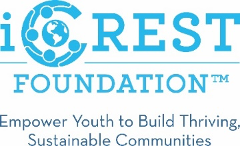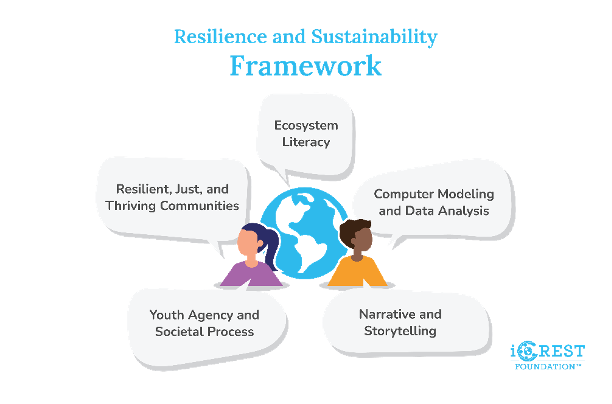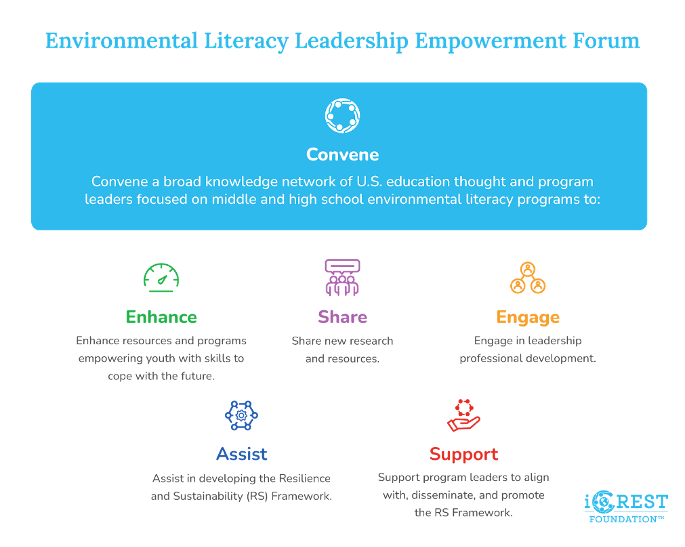
Mission
The mission of the iCREST Foundation is to enrich the ecosystem of environmental education providers by convening leaders of these organizations to collaborate, explore partnerships, share resources, and support each other’s work thereby enhancing their capacity to reach and impact youth.
History
The iCREST concept was first conceived in 2014 by Drs. Bishop and Heller and then launched in 2016 as the education initiative of the International Centre for Earth Simulation (ICES) Foundation. The ICES Foundation provided guidance and start-up funding to establish the iCREST Foundation as an independent 501c3 US-based Membership organization which was registered in the state of Delaware on September 26, 2022.
Since its inception in 2014, the initiative which grew into the iCREST Foundation has worked to convene a broad knowledge network of U.S. education, thought, and program leaders already focused on U.S. middle and high school environmental literacy programs to enhance existing resources and programs empowering youth with skills they need for coping with the future they will inherit. Today, the iCREST Foundation is actively implementing its strategic plan to conduct a Forum of environmental education leaders and develop a Resilience and Sustainability Framework to help kids build socially and environmentally resilient communities that safeguard Earth’s increasingly challenged life support system.
1. Resilience and Sustainability Framework
The iCREST Foundation is committed to the realization of a Resilience and Sustainability (RS) Framework based on the most important skill sets that the next generation need to thrive, succeed, and cope with environmental challenges and their socioeconomic consequences in the decades ahead. Those skill sets are embodied in the five principles, established by the iCREST Education Advisory Board (see illustration below).

The RS Framework is the intellectual glue that will:
· Create a unified, collective vision for middle and high school education ecosystem literacy with a Science, Technology, Engineering, Arts, and Mathematics (STEAM) and/or Career Technical Education (CTE) approach.
· Initiate a movement within the middle and high school education community specific to the RS Framework.
· Establish a common language for education around environmental priorities.
· Help developers of environmental literacy curriculum align their work to a shared Framework used by educators and program leaders.
· Disseminate information to practitioners, policymakers, and influencers with a consistent theme.
· Coalesce public and private organizations with similar objectives of addressing such pressing challenges facing youth.
2. Environmental Literacy Leadership Empowerment Forum
A growing number of school and out-of-school programs (e.g., clubs and community programs) aim to empower our youth to engage and address the most pressing environmental challenges of our time – how to mitigate and reverse damage to our environment as well as adapt to environmental changes and live sustainably on our planet. The iCREST Foundation focus is to enhance the impact of these efforts by convening and conducting Forums that bring together key leaders of organizations already focused on climate and environmental education and literacy, and Earth system science exploration and discovery. These Forums serve as a catalyst to supercharge environmental literacy organizations with similar objectives to build on their collective strengths and networks and share the work they are doing to create synergy, overcome fragmentation, generate new knowledge, leverage limited resources, empower leadership, and reach greater numbers of middle and high school youth through schools, clubs, and community programs (see Illustration below).

Utilizing the research, resources, and experience of the Forum combined with the RS Framework, the iCREST Foundation aims to bring resilience and sustainability education to U.S. middle and high school youth to promote environmental stewardship and improve public health, safety, and wellbeing through student learning and engagement in STEAM and CTE. The iCREST Foundation, enabled by the network of Earth system science experts, facilitates the exchange, sharing and dissemination of the most up-to-date environmental information among the partner organizations and their networks. Equipped with the skill sets of the RS Framework, today’s students will position the U.S. as a global leader in environmental stewardship and preservation in the decades ahead.
The RS Framework and the Forum combined will be a unique and effective learning catalyst for change, future performance, and future learning.
A downloadable summary of the iCREST Foundation story can be found below.